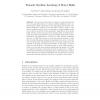Free Online Productivity Tools
i2Speak
i2Symbol
i2OCR
iTex2Img
iWeb2Print
iWeb2Shot
i2Type
iPdf2Split
iPdf2Merge
i2Bopomofo
i2Arabic
i2Style
i2Image
i2PDF
iLatex2Rtf
Sci2ools
AMS
2007
Springer
2007
Springer
Towards Machine Learning of Motor Skills
Autonomous robots that can adapt to novel situations has been a long standing vision of robotics, artificial intelligence, and cognitive sciences. Early approaches to this goal during the heydays of artificial intelligence research in the late 1980s, however, made it clear that an approach purely based on reasoning or human insights would not be able to model all the perceptuomotor tasks that a robot should fulfill. Instead, new hope was put in the growing wake of machine learning that promised fully adaptive control algorithms which learn both by observation and trial-and-error. However, to date, learning techniques have yet to fulfill this promise as only few methods manage to scale into the high-dimensional domains of manipulator robotics, or even the new upcoming trend of humanoid robotics, and usually scaling was only achieved in precisely pre-structured domains. In this paper, we investigate the ingredients for a general approach to motor skill learning in order to get one st...
AMS 2007 | Artificial Intelligence | Artificial Intelligence Research | Communications | General Approach |
| Added | 07 Jun 2010 |
| Updated | 07 Jun 2010 |
| Type | Conference |
| Year | 2007 |
| Where | AMS |
| Authors | Jan Peters, Stefan Schaal, Bernhard Schölkopf |
Comments (0)

